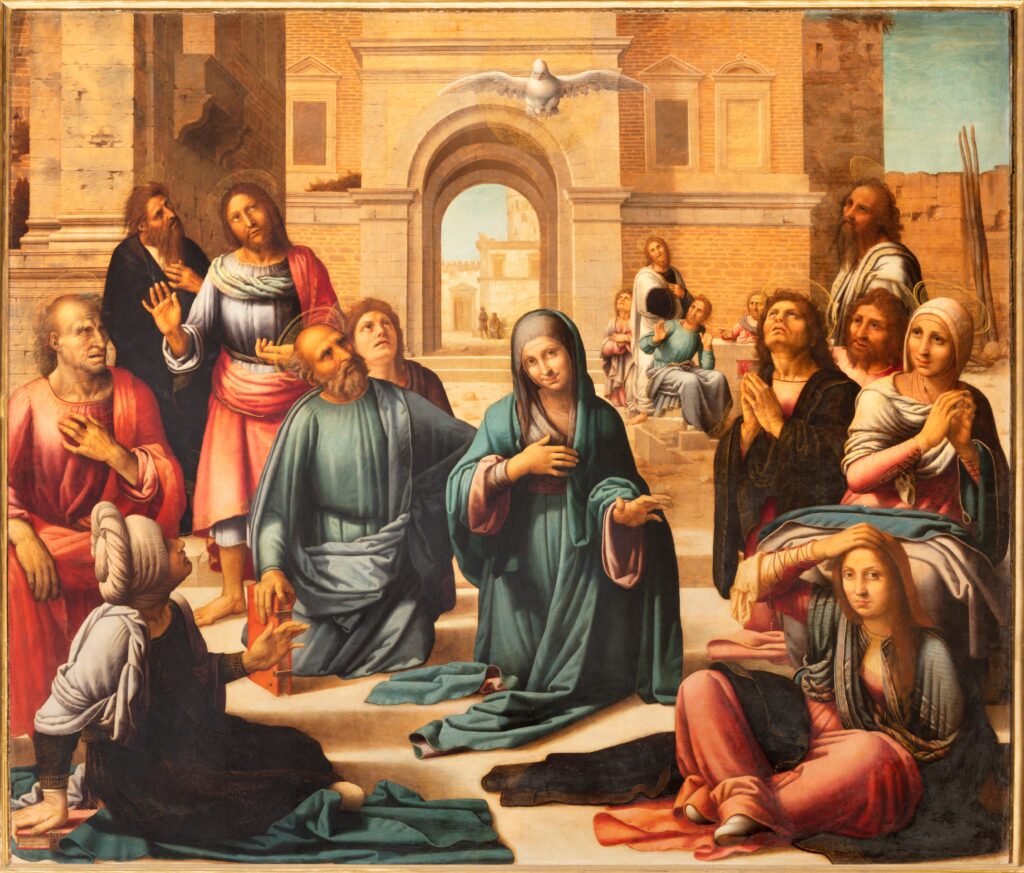
The Christian Holiday of Pentecost is being celebrated on Sunday 28th May this year. It is a celebration referencing the New Testament, in where the Holy Spirit descends upon Jesus’ followers and Apostles who had gathered from many countries to celebrate at a feast. What is detailed to have happened there is the earliest recorded mention of multilingual communication.
Recounted in Acts 2:1-6 : ‘And they were all filled with the Holy Spirit, and began to speak with other languages, as the Spirit gave them utterance. And there were dwelling at Jerusalem Jews, devout men, out of every nation under heaven. Now when this was noised abroad, the multitude came together, and were confounded, because that every man heard them speak in his own language*.
It is claimed that the Apostles, joined by hundreds of followers of Christ from a number of different nations, began to communicate in many languages. Based on geographical estimations there would have been attendees from several Middle Eastern and Arabic speaking regions as well as African and European presence. Whilst the events in the bible are documented long before physical or visual proof could be produced to clarify these happenings, the fact that a multilingual meeting of like minded individuals is captured in such an influential and important scripture.
This means that long before the dawn of modern translation and localization, there were individuals communicating in various tongues. Be it through education in these languages or via the power of the Holy Spirit, our industry’s foundations were being laid as far back as AD 32 (although the exact date is unknown).

Even the word Pentecost is derived from Greek, but allocated to a Hebrew celebration, showing that cultural boundaries were being crossed long before we could even begin to imagine. The Christian holiday (also known as Whitsunday) is celebrated globally, the with scriptures now said to be translated into over 1142 languages worldwide**. Whilst the story of the event varies from testament to testament, the basis of this amazing tale stays the same. The coming together of numerous cultures all conversing in their own tongue.
As the world and different faiths have evolved, multiculturalism is now a mainstay of modern life for most of us. Christianity, Judaism, Buddhism, Muslim faith and more beliefs are being adopted outside of their native origins, making the need and requirement for translation of their scriptures more and more common. It is fascinating to think, that no matter what religion or beliefs you follow, or where you are in the world, that message can now be received in your native language at the push of a button. Even religion has adapted to the technical revolution.
In order to have multi-lingual followers, it stands to reason that there are many translations of all religious texts.
The Bible is one of the most translated texts in the world, with parts of it available in over 3,000 languages. The full Bible has been translated into 704 languages, and the New Testament into 1,548 languages. The most translated book of the Bible is the book of Psalms, which has been translated into 1,153 languages.
The Quran is also widely translated, with translations available in more than 100 languages. However, unlike the Bible, translations of the Quran are often not considered to be the true Quran and are sometimes referred to as interpretations or translations of the meanings of the Quran.
Other religious texts that have been widely translated include the Bhagavad Gita, which has been translated into over 80 languages, and the Tao Te Ching, which has been translated into over 50 languages.
It’s worth noting that the number of translations can vary depending on how they are counted. For example, some translations may only cover parts of a text, while others may be considered more accurate or authoritative than others.
From the first recording of a multilingual gathering or event, to some the most translated books in the world, our culture, belief and philosophy influence the languages spoken and shared today.
*source – The New Testament; Acts 2:1-6
**source – https://en.wikipedia.org/wiki/Bible_translations
The number of translations of the Bible comes from the United Bible Societies, which maintains a database of translations of the Bible. You can find more information on their website: https://www.unitedbiblesocieties.org/bible/

The number of translations of the Quran is based on estimates from various sources, including the Center for Muslim-Jewish Engagement at the University of Southern California and the Islamic Educational, Scientific, and Cultural Organization. The exact number of translations may be difficult to determine due to the differences in interpretation and translation of the Quran.
The figures for the Bhagavad Gita and Tao Te Ching come from UNESCO’s Index Translationum database, which tracks the publication of translations worldwide. You can search the database here: http://www.unesco.org/xtrans/bsresult.aspx?lg=0&stxt=bhagavad+gita&fr=advanced_search
and here:
http://www.unesco.org/xtrans/bsresult.aspx?lg=0&stxt=tao+te+ching&fr=advanced_search
Upload your documents to WordsOnline and pay online for a fast, simple service. 10% discount on your first order
We will help you transition to the new world of continuous localization!